Fleurs du Mal Magazine


Or see the index
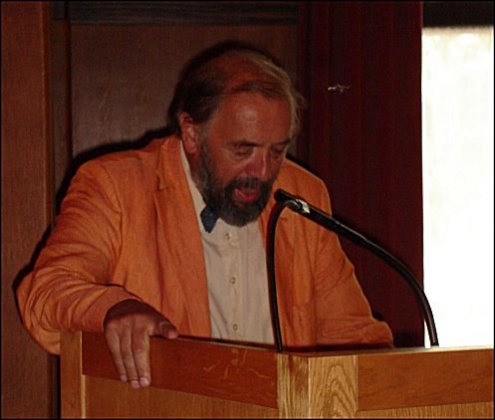
foto jefvankempen
In Memoriam Driek van Wissen (1943-2010)
Driek van Wissen werd in 1943 geboren in de stad Groningen, waar hij nog steeds woonachtig was. Hij studeerde er Nederlands aan de Rijksuniversiteit en van 1968 tot 2005 was hij werkzaam als docent Nederlands aan het Dr. Aletta Jacobs College te Hoogezand. Van 1975 tot 1977 was hij redacteur van het Groningse tijdschrift “De Nieuwe Clercke”. Vanaf 1976 verschenen bundels van zijn hand bij verschillende uitgeverijen.
Driek van Wissen was een vormvast dichter. Hij schreef onder meer kwatrijnen, rondelen en ollekebollekes, maar het sonnet had zijn bijzondere voorkeur. Zijn gedichten zijn over het algemeen vrij luchtig van toon, hij wordt dan ook meestal tot de light-verse-dichters gerekend. In 1987 werd Driek van Wissen onderscheiden met de Kees Stip Prijs voor light verse.
In 2005 werd Van Wissen verkozen tot Dichter des Vaderlands als opvolger van Gerrit Komrij. In 2009 werd hij opgevolgd door Ramsey Nasr.
Driek van Wissen overleed op 20 mei 2010 op 66-jarige leeftijd in Istanbul aan de gevolgen van een hersenbloeding.
Moeder en kind
Mijn moeder leefde voor zichzelf te lang;
Vandaar dat zij haar laatste grijze dagen
Veelal verdeed met mopperen en klagen,
Een vruchteloze, zure zwanenzang.
Toch schepte zij een kinderlijk behagen
In onze dagelijkse ommegang
Als ik weg uit het huis, uit haar gevang
Haar rondreed in haar invalidenwagen.
De vreugde was niet altijd onverdeeld:
Ik deed het half uit liefde, half verveeld,
Maar ik kwam in het park soms halverwege
Een moeder met een kinderwagen tegen
En zag dan het verdraaide spiegelbeeld
Hoe ik ooit in haar wagen had gelegen.
Driek van Wissen, uit: Voor het vaderland weg, 2009
Photo: kemp=mag 2005
fleursdumal.nl magazine
More in: Archive W-X, City Poets / Stadsdichters, LIGHT VERSE
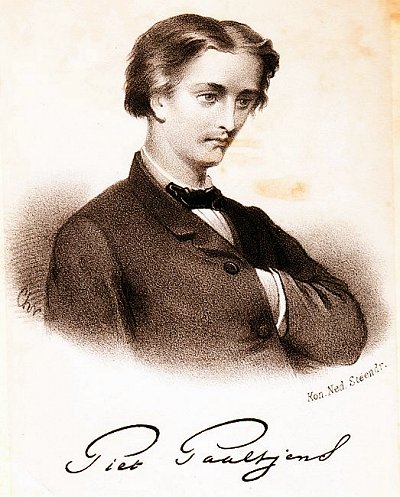
Piet Paaltjens
(François HaverSchmidt, 1835-1894)
De zelfmoordenaar
In het diepst van het woud
– ‘t Was al herfst en erg koud –
Liep een heer in zijn eentje te dwalen.
Och, zijn oog zag zoo dof!
En zijn goed zat zoo slof!
En hij tandknerste, als was hij aan ‘t malen.
“Harriot!” dus riep hij verwoed,
“‘k Heb een adder gebroed,
Neen, erger, een draak aan mijn borst hier!”
En hij sloeg op zijn jas,
En hij trapte in een plas;
‘t Spattend slik had zijn boordjes bemorst schier.
En meteen zocht zijn blik
Naar een eiketak, dik
Genoeg om zijn lichaam te torschen.
Daarna haalde hij een strop
Uit zijn zak, hing zich op,
En toen kon hij zich niet meer bemorsen.
Het werd stil in het woud
En wel tienmaal zo koud,
Want de wintertijd kwam. En intusschen
Hing maar steeds aan zijn tak,
Op zijn doode gemak,
Die mijnheer, tot verbazing der musschen.
En de winter vlood heen,
Want de lente verscheen,
Om opnieuw voor den zomer te wijken.
Toen dan zwierf – ‘t was erg warm –
Er een paar arm in arm
Door het woud. Maar wat stond dát te kijken!
Want, terwijl het, zoo zacht
Koozend, voortliep en dacht:
Hier onder deez’ eik is ‘t goed vrijen,
Kwam een laars van den man,
Die daar boven hing, van
Zijn reeds lang verteerd linkerbeen glijen.
“Al mijn leven! van waar
Komt die laars?” riep het paar,
En werktuigelijk keek het naar boven.
En daar zag het met schrik
Dien mijnheer, eens zo dik
En nu tot een geraamte afgekloven.
Op zijn grijzende kop
Stond zijn hoed nog rechtop,
Maar de rand was er af. Al zijn linnen
Was gerafeld en grauw.
Door een gat in zijn mouw
Blikten mieren en wurmen en spinnen.
Zijn horloge stond stil,
En één glas van zijn bril
Was kapot en het ander beslagen.
Op den rand van een zak
Van zijn vest zat een slak,
Een erg slijmrige slak, stil te knagen.
In een wip was de lust
Om te vrijen gebluscht
Bij het paar. Zelfs geen woord dorst het te spreken.
‘t Zag van schrik zóó spierwit
Als een laken, wen dit
Reeds een dag op het gras ligt te bleeken.
Piet Paaltjens (François HaverSchmidt) gedicht
• fleursdumal.nl magazine
More in: # Classic Poetry Archive, Archive G-H, Archive O-P, Archive O-P, Suicide
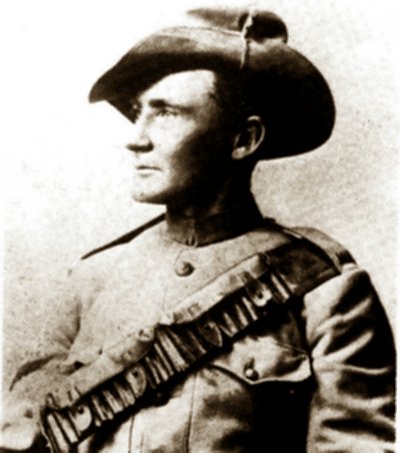
Harry ‘Breaker’ Morant
(1865-1902)
When The Light Is As Darkness
The morning-tide is fair and bright,
With golden sun up-springing;
The cedars glowed in the new-born light,
And the bell-bird’s note was ringing;
While diamonds dropped by dusky Night,
Were yet to the gidyas clinging.
The morning waned-the sun rose high
O’erhead, until ’twas seeming
But a dazzling disc, and the fiery sky
Like an opal sea was gleaming;
And languorous flowers – of morn gone by,
And coming eve – fell dreaming.
And now the moon above does creep
To laugh at red Sol sinking;
While wakening from their sunlit sleep,
A few wan stars are blinking,
And thirsty, drooping flowers deep
Of evening dews are drinking.
The birds will soon their carols cease,
And crows are homeward hieing;
The gloaming deepens, stars increase,
The weary day is dying –
Its requiem, murmurous of peace,
The vesper winds are, sighing.
This night is near! Are you waiting friend,
That Night? – we’re drawing nigh it –
When we to the Restful Land shall wend,
And leave life’s feverish riot –
When the gods to each tired soul shall send
Eternal, dreamless quiet.
Harry ‘Breaker’ Morant poetry
kempis poetry magazine
.jpg)
More in: Archive A-B, Archive M-N

Alice De Chambrier
(1861-1882)
Chanson Du Soir
Sur nos fronts déployant ses ailes,
La nuit aux yeux rêveurs étend
Son voile émaillé d’étincelles
Comme la robe d’un sultan.
Le lac enveloppe ses grèves
D’un long baiser rempli d’amour:
Le monde s’abandonne aux rêves
Qui naissent au déclin du jour.
L’âme s’envole sur la trace
D’un nuage au reflet vermeil,
Qui fuit tout joyeux dans l’espace
A la poursuite du soleil.
Elle franchit les monts tranquilles,
Qui vont songeurs dans l’infini
Perdre leurs sommets immobiles
Où les grands aigles font leur nid.
Elle sourit aux vertes plaines
Où paissent les troupeaux joyeux,
Écoute les chansons lointaines
Qui montent dans l’azur des cieux;
Elle se penche sur les rives
Des grands fleuves au bord glissant,
Et dont les ondes fugitives
A l’inconnu vont en dansant;
Elle effleure les sombres plages
Où, contre les rochers géants,
Viennent avec des cris sauvages
Mourir les flots des océans;
Elle erre sur les forêts vierges,
Passe au-dessus des hauts palmiers
Dont les troncs droits semblent les cierges
D’un temple aux immenses piliers….
Et, quittant les terres connues,
Elle s’en va, d’un seul élan,
Au delà des rapides nues,
Dans le grand ciel étincelant.
Puis elle s’arrête, indécise,
Croyant reconnaître, égaré
Dans un murmure de la brise,
Un timbre de voix adoré….
Doux souvenir d’êtres qu’elle aime,
Partis pour des lieux inconnus,
Et qui, depuis l’heure suprême,
Ne sont, hélas! pas revenus!…
Et l’âme, triste, se réveille,
Frissonnant dans l’ombre du soir:
Le nuage à l’aile vermeille
A disparu dans le ciel noir…
1880
Alice De Chambrier poetry
Chanson Du Soir
• fleursdumal.nl magazine
.jpg)
More in: Alice De Chambrier, Archive C-D, Chambrier, Alice De

PIERRE KEMP
Een leven
door Wiel Kusters
Een van de boeiendste eenlingen uit de Nederlandse poëzie van de twintigste eeuw is de dichter Pierre Kemp (1886-1967). Vanuit zijn Maastrichtse ‘dichterkluisje’, ver van het door hem verafschuwde artistieke leven, bereikte hij met zijn even vitale als melancholische poëzie de harten van zeer veel schrijvende en lezende Nederlanders. In 1956 werd hem de Constantijn Huygensprijs toegekend, in 1958 volgde de P.C. Hooftprijs. Het op de achterzijde van deze prospectus geciteerde gedicht ‘Bloem’ is typerend voor Pierre Kemps blijmoedigheid. Maar uit zijn pen vloeiden ook regels als:
CRITISCH
Ik voel mij door het licht verplicht
te leven,
maar eer ik me aan die plicht om ’t licht
wil geven,
moet ik weten, of het nog anders is
dan in brand gevlogen duisternis
Wie was Pierre Kemp? Hoe werd deze ‘Man in het Zwart’, die werkte op het loonbureau van een Zuid-Limburgse steenkolenmijn, een van ’s lands kleurrijkste dichters? Wiel Kusters schreef een biografie van Pierre Kemp, rijk aan interpretaties van levensfeiten, poëzie en de samenhang daartussen. Hij brengt veel nieuwe gegevens boven water, onder andere over Kemps Muzen. En over het dichterlijke spel dat Kemp zijn leven lang wilde spelen, naast en in het dagelijks bestaan, omdat één leven niet genoeg kon zijn.
Wiel Kusters (1947) heeft niet alleen naam gemaakt als dichter, maar ook als schrijver over literatuur. Bij Vantilt verscheen van hem in 2008 Koolhaas’ dieren.
Over Koolhaas’ dieren: ‘De vele heldere literaire analyses maken Koolhaas’ dieren tot een waardevol boek. (L.H. Wiener, NRC Handelsblad)
UITGEVERIJ VANTILT – ISBN 9789460040443 – NUR 321
Gebonden, geillustreerd, deels in kleur, 14×22 cm, ±800 pagina’s
± € 39,95 | verschijnt mei 2010
fleursdumal.nl magazine
More in: - Book News, Archive K-L, Archive K-L, Kemp, Pierre, Wiel Kusters
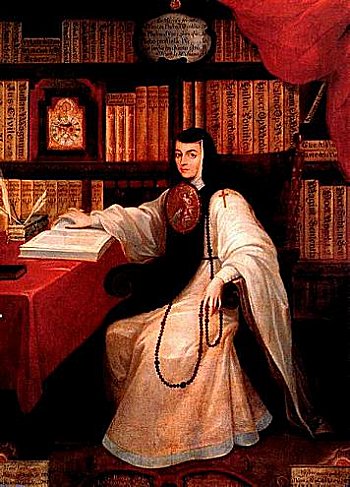
Sor Juana Ines de la Cruz
(1651-1695)
Hombres
Hombres necios que acusáis
a la mujer sin razón,
sin ver que sois la ocasión
de lo mismo que culpáis:
si con ansia sin igual
solicitáis su desdén,
¿por qué quereis que obren bien
si las incitáis al mal?
Combatís su resistencia
y luego, con gravedad,
decís que fue liviandad
lo que hizo la diligencia.
Parecer quiere el denuedo
de vuestro parecer loco,
al niño que pone el coco
y luego le tiene miedo.
Queréis, con presunción necia,
hallar a la que buscáis,
para pretendida, Thais,
y en la posesión, Lucrecia
¿Qué humor puede ser más raro
que el que, falto de consejo,
el mismo empaña el espejo
y siente que no esté claro?
Con el favor y el desdén
tenéis condición igual,
quejándoos, si os tratan mal,
burlándoos, si os quieren bien.
Opinión, ninguna gana:
pues la que más se recata,
si no os admite, es ingrata,
y si os admite, es liviana
Siempre tan necios andáis
que, con desigual nivel,
a una culpáis por crüel
y a otra por fácil culpáis.
¿Pues cómo ha de estar templada
la que vuestro amor pretende,
si la que es ingrata, ofende,
y la que es fácil, enfada?
Mas, entre el enfado y pena
que vuestro gusto refiere,
bien haya la que no os quiere
y quejaos en hora buena.
Dan vuestras amantes penas
a sus libertades alas,
y después de hacerlas malas
las queréis hallar muy buenas.
¿Cuál mayor culpa ha tenido
en una pasión errada:
la que cae de rogada
o el que ruega de caído?
¿O cuál es más de culpar,
aunque cualquiera mal haga:
la que peca por la paga
o el que paga por pecar?
Pues ¿para quée os espantáis
de la culpa que tenéis?
Queredlas cual las hacéis
o hacedlas cual las buscáis.
Dejad de solicitar,
y después, con más razón,
acusaréis la afición
de la que os fuere a rogar.
Bien con muchas armas fundo
que lidia vuestra arrogancia,
pues en promesa e instancia
juntáis diablo, carne y mundo.
You Men
Silly, you men-so very adept
at wrongly faulting womankind,
not seeing you’re alone to blame
for faults you plant in woman’s mind.
After you’ve won by urgent plea
the right to tarnish her good name,
you still expect her to behave—
you, that coaxed her into shame.
You batter her resistance down
and then, all righteousness, proclaim
that feminine frivolity,
not your persistence, is to blame.
When it comes to bravely posturing,
your witlessness must take the prize:
you’re the child that makes a bogeyman,
and then recoils in fear and cries.
Presumptuous beyond belief,
you’d have the woman you pursue
be Thais when you’re courting her,
Lucretia once she falls to you.
For plain default of common sense,
could any action be so queer
as oneself to cloud the mirror,
then complain that it’s not clear?
Whether you’re favored or disdained,
nothing can leave you satisfied.
You whimper if you’re turned away,
you sneer if you’ve been gratified.
With you, no woman can hope to score;
whichever way, she’s bound to lose;
spurning you, she’s ungrateful—
succumbing, you call her lewd.
Your folly is always the same:
you apply a single rule
to the one you accuse of looseness
and the one you brand as cruel.
What happy mean could there be
for the woman who catches your eye,
if, unresponsive, she offends,
yet whose complaisance you decry?
Still, whether it’s torment or anger—
and both ways you’ve yourselves to blame—
God bless the woman who won’t have you,
no matter how loud you complain.
It’s your persistent entreaties
that change her from timid to bold.
Having made her thereby naughty,
you would have her good as gold.
So where does the greater guilt lie
for a passion that should not be:
with the man who pleads out of baseness
or the woman debased by his plea?
Or which is more to be blamed—
though both will have cause for chagrin:
the woman who sins for money
or the man who pays money to sin?
So why are you men all so stunned
at the thought you’re all guilty alike?
Either like them for what you’ve made them
or make of them what you can like.
If you’d give up pursuing them,
you’d discover, without a doubt,
you’ve a stronger case to make
against those who seek you out.
I well know what powerful arms
you wield in pressing for evil:
your arrogance is allied
with the world, the flesh, and the devil!
Sor Juana Ines de la Cruz poetry
kempis poetry magazine
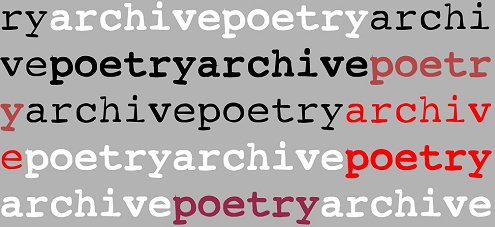
More in: Archive C-D, Archive I-J
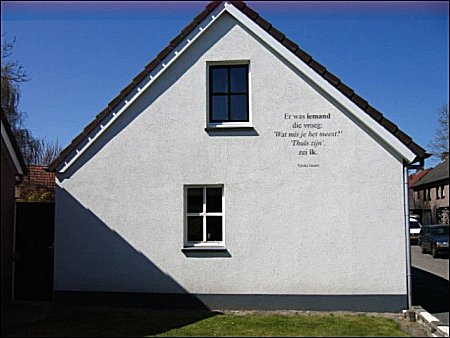
Gedicht Tjitske Jansen op gevel in Gilze-Rijen
In de gemeente Gilze-Rijen is in een serie van zes gevelgedichten het vierde gedicht aangebracht.
Het gaat om het gedicht ‘Er was iemand’ van Tjitske Jansen (Barneveld 1971)
uit: Koerikoeloem. Amsterdam 2007
Plaats: Gilze
Ridderstraat 43
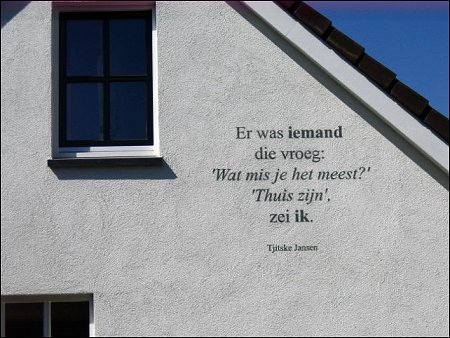
Gevelgedichten’ is een project van Hanneke van Kempen, Louis Chamuleau
en Jan de Jong namens de kunstcommissie Gilze en Rijen. De vormgeving
van de gedichten is van Frank Hermens (Hermens Concepts & Creations,
Rijen), het schilderwerk van Suk-Won Buter (Schildersbedrijf Buter,
Rijen). Met dank aan de eigenaren van de panden met de gevels achter de
gedichten.
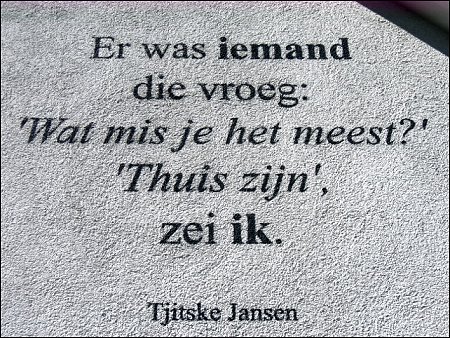
fleursdumal.nl magazine
More in: Archive I-J, Hanneke van Kempen, Jansen, Tjitske, Street Art
![]()
John Frederick Freeman
(1880 – 1929)
More Than Sweet
The noisy fire,
The drumming wind,
The creaking trees,
And all that hum
Of summer air
And all the long inquietude
Of breaking seas—-
Sweet and delightful are
In loneliness.
But more than these
The quiet light
From the morn’s sun
And night’s astonished moon,
Falling gently upon breaking seas.
Such quietness
Another beauty is–
Ah, and those stars
So gravely still
More than light, than beauty pour
Upon the strangeness
Of the heart’s breaking seas.
John Frederick Freeman poetry
kempis poetry magazine
More in: Archive E-F
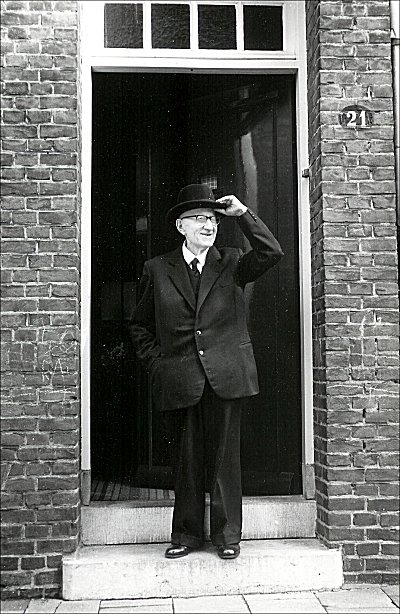
Pierre Kemp bij zijn huis in de Turennestraat.
Foto Henri de Bouter, 1961. Letterkundig museum.
Bonnefantenmuseum Maastricht
Pierre Kemp
Nobel oud kind !
30.05 – 29.08.2010
‘Lang voordat Pierre Kemp op een nogal unieke manier naam maakte in de Nederlandse literatuur’, aldus Kemp-vorser Fred van Leeuwen, ‘was hij schilder. Daarna is hij een schrijvende schilder geworden. Toen een schilderende schrijver. En tenslotte een schrijver die zelfs niet meer wilde schilderen.’
Kemps meest eigenzinnige schilderwerk ontstond in de periode tussen 1929 en 1935. Geïnspireerd door het symbolisme en Duits expressionisme hanteerde Kemp een helder kleurgebruik en een fantasierijke, naïeve beeldtaal, die niet erg aansloten bij het werk van zijn tijdgenoten. In 1935 stopte Kemp definitief met schilderen.
De collectie van het Bonnefanten omvat het grootste deel van Kemps beeldende oeuvre. Bij gelegenheid van de presentatie op zondag 30 mei in Centre Ceramique van de biografie: Pierre Kemp. Een leven, van de hand van dichter en hoogleraar letterkunde Wiel Kusters opent op de derde verdieping van het Bonnefantenmuseum een overzicht van werken van de beeldend kunstenaar Pierre Kemp. In de tentoonstelling zijn een veertigtal olieverfschilderijtjes, werken op papier en schetsboekjes te zien, alsmede archief- en ander documentatiemateriaal over zijn beeldende oeuvre en persoonlijke leven.
.jpg)
Bij zijn jarenlange onderzoek kwam Wiel Kusters op het spoor van een twaalftal werken op papier die met grote waarschijnlijkheid kunnen worden toegeschreven aan Pierre Kemp. Deze pastels werden aangetroffen in de nalatenschap van pater J. van Well, S.J. die het de jonge Kemp mogelijk had gemaakt afscheid te nemen van de Societe Ceramique, waar hij als plateelschilder werkte, om zich een jaar lang toe te leggen op de verdere ontwikkeling van zijn talent. Van de oogst van dit schilderjaar is tot nu toe niets teruggevonden, maar de nu opgedoken werken hebben er vrijwel zeker deel van uitgemaakt.
Pierre Kemp (1886-1967) werd in 1959 bekroond met de Staatsprijs voor Letterkunde, de P.C. Hooftprijs, en daarmee gecanoniseerd als een van de grote Nederlandse dichters van de twintigste eeuw. Het grootste deel van zijn leven heeft Kemp in Maastricht doorgebracht, afgezien van een verblijf van nog geen jaar in Amsterdam, als leerling-journalist bij het dagblad De Tijd (1915), en natuurlijk ook van de vele uren die hij werkzaam was als loonadminstrateur bij de steenkolenmijn Laura in Eygelshoven (1916-1945).
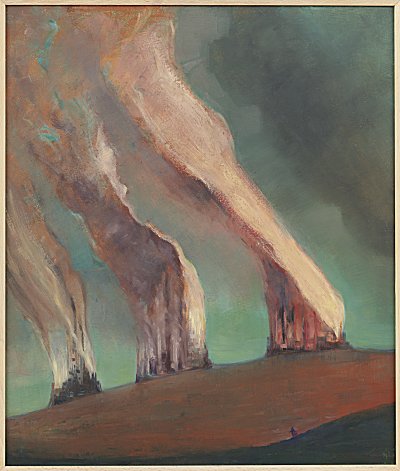
Pierre Kemp, Concerns, 1941
Olieverf op karton 54,4 x 46,1 cm
Rondom de tentoonstellingen worden er een aantal rondleidingen georganiseerd, inclusief focusrondleidingen door Wiel Kusters, auteur “Pierre Kemp. Een leven” (zondag 6 juni om 15.00 uur) en door conservator Paula van den Bosch, samensteller van de tentoonstelling (zondag 4 juli om 15.00 uur). De focusrondleidingen duren een uur en zijn gratis op vertoon van een geldig entreebewijs. Reserveren: reservations@bonnefanten.nl
Vanaf juli 2010 zullen een reeks zomerworkshops voor kinderen georganiseerd worden rondom het werk van Pierre Kemp: Dichterlijke doeken ! van 27 t/m 30 juli en van 24 t/m 27 augustus.
Op zondag 30 mei vindt er een speciale middag rond Pierre Kemp plaats in Centre Ceramique en het Bonnefantenmuseum. De dag zal als volgt worden ingevuld:
14.00 uur: WIEL KUSTERS’ nieuwe biografie van Pierre Kemp – ‘een van de boeiendste eenlingen uit de Nederlandse poëzie van de twintigste eeuw’ – (Pierre Kemp. Een leven, Nijmegen: Vantilt) zal ten doop gehouden worden. Dr. Jan de Roder (Universiteit Maastricht) houdt een korte inleiding en voert een gesprek met de biograaf. Voorts zal er muziek van Hendrik Andriessen ten gehore gebracht worden, op tekst van Kemp.
16.00 uur: In het Bonnefantenmuseum zal aansluitend de tentoonstelling van het werk van Kemp worden geopend. In de tentoonstelling zijn een veertigtal olieverfschilderijtjes, werken op papier en schetsboekjes te zien, alsmede archief- en ander documentatiemateriaal over zijn beeldende oeuvre en persoonlijke leven.
Naast zijn beeldende oeuvre wordt ook hierin een korte film over de dichter-schilder uit 1967 vertoond. Deze film is meer dan veertig jaar niet meer te zien geweest. Zij bevat de enige bewegende beelden die er van de dichter bestaan.
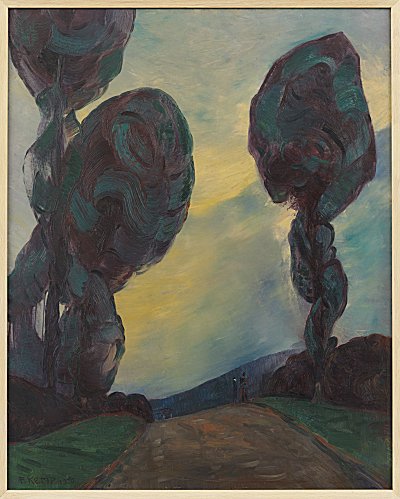
Pierre Kemp, Landschap met dame, dood en duivel,
1939 Olieverf op karton 50,2 x 40,2 cm
fleursdumal.nl magazine
More in: Archive K-L, Kemp, Pierre
.jpg)
L o u i s T h. L e h m a n n
door Ed Schilders
Louis Lehmann werd geboren in 1920, begon in 1939 te publiceren in kranten en tijdschriften, en had dus zijn zilveren schrijversjubileum al gevierd toen hij zichzelf in 1966 een literair publicatieverbod oplegde. Ik heb de uitleg van die zelfopgelegde stilte nooit helemaal begrepen, en dat is ook nu weer het geval als de kwestie ter sprake komt in de inleiding door Alida Beekhuis op Lehmanns nieuwe boek Laden ledigen. Het verhaal is altijd hetzelfde: Lehmann voelt zich erkend als dichter/schrijver – Ter Braak en Vestdijk hadden hem hun lof toegewuifd – en tegelijk miskend ‘op zijn vakgebied’, de scheepsarcheologie. Hij blijft schrijven en muziekstukken componeren, maar neemt zich voor niets daarvan te publiceren totdat hij ook als archeoloog erkenning gekregen heeft. Dat duurt even. Dertig jaar. In 1996 promoveert hij op een proefschrift over door roeiers voortbewogen galeischepen in de oudheid, en wel voor zover dat onderwerp werd benaderd in de Renaissance en tijdens de Barok. Alida Beekhuis noemt het ‘een zeer belangrijke gebeurtenis in zijn leven.’ En: ‘daarmee hief hij zijn ban op literaire publicaties op.’ Twee weken na de promotie had Lehmann een nieuwe dichtbundel persklaar.
Wie moest met dat publicatieverbod gestraft worden? De wetenschap, de poëzieliefhebber, of de auteur zelf? Was het hoogmoed of juist nederigheid? Je zou het hoe dan ook een vorm van gevaarlijk literair leven kunnen noemen. Lehmann is 75 jaar als de kersverse doctor de oude dichter weer vrijheid van drukpers toestaat. Dertig jaar niet publiceren! Dat lijkt, achteraf, zoiets als de zelfverkozen status van ‘poète maudit’; Lehmann kon al die tijd immers ook niet bevroeden dat hij in 1996 nog aan zijn beste letterjaren zou beginnen als ‘éminence grise’. In druk onder andere met een verzameluitgave die door Tom van Deel werd samengesteld; als presentator van en commentator op bijzondere muziekopnamen op VPRO-radio; als troeteldichter op poëziefestivals, waar hij met aanstekelijk plezier voorleest, rapt, tapt, en in de afterparty de tango danst.
Laden ledigen zegt het al: wat gedurende die dertig jaar geschreven werd, is nu uit de spreekwoordelijke lade bevrijd. Bovendien had de auteur vóór die tijd ook al een ladekastje en uit dat meubilair is nu een uitbundige keuze gemaakt. Dat Lehmann kan dichten en dansen, dat hij mondharmonica speelt en piano, dat wisten we al. Uit de ladekasten zijn nu ook vertalingen van Engelse en Spaanse poëzie opgegraven. Er komen partituren van zijn composities aan het licht. Tekeningen uit 1938, en een toneeltekst. Transcripties ook van de ‘praatjes’ die hij in zijn VPRO-muziekprogramma hield dan wel voorlas, met als uiterst vervreemdend effect dat de besproken muziekstukken uiteraard niet gedraaid worden: ‘Ik zal nu besluiten met ‘King of Kings’. En daarmee neem ik afscheid van u.’
Het zwaartepunt van het boek ligt bij de poëzie. Die is zoals we Lehmanns werk hebben leren waarderen: in de vorm zeer gevarieerd, en wars van elke letterkundige conventie – alleen Lehmann komt ermee weg om ‘Oidipoes’ te laten rijmen op ‘O, die poes’ en ‘octopus’. Een groot aantal gedichten verwijst inderdaad naar de tijd waarin ze in de lade beland zijn. Over de vernieuwing dan wel vernieling van de binnenstad van Amsterdam spreekt de dichter met grote regelmaat zijn anathema uit, te beginnen bij burgemeester Samkalden en ideoloog Han Lammers. Er worden zeldzame woorden gebruikt als ‘ludiek’. Een vijfregelig vers begint met: ‘Huisje slopen, bankje bouwen,/ Van Rokin tot Overtoom…’ Het werkt nog beter als je beseft dat je dat moet lezen op de melodie van ‘Zakdoek leggen/ Niemand zeggen…’ Het zijn periodestukken, maar wel heel mooie, en ze zijn in hun poëtische bedoeling nog lang niet verouderd, misschien wel weer urgent geworden.
De belangrijkste bijdrage is echter de eerste, getiteld ‘Fragmenten jeugd’. Autobiografie op zijn Lehmanns. In dertig pagina’s beschrijft hij alles (zegt hij) wat hij zich herinnert uit zijn jeugd (die bij Lehmann ook nog eens vijfendertig jaar duurt, totdat hij ‘naar Amsterdam vertrok’). Deze schets dient te worden gelezen als de hiëroglyfen op antieke tempelwanden – bevat zelfs enige soortgelijke tekeningen – en biedt de sleutels waarmee een aantal van de gedichten nader ontsloten kan worden. Met Laden ledigen is Lehmann de archeoloog van zijn eigen oeuvre geworden. Het is de ultieme verzoening van de doctor met de dichter.
Laden ledigen – een keuze uit hervonden werk van L. Th. Lehmann – De Bezige Bij – ISBN 978 90 234 2774 2
Eerder gepubliceerd in De Volkskrant
Ed Schilders over Louis Th. Lehmann
fleursdumal.nl magazine
More in: Archive K-L, Ed Schilders, Lehmann, Louis Th.
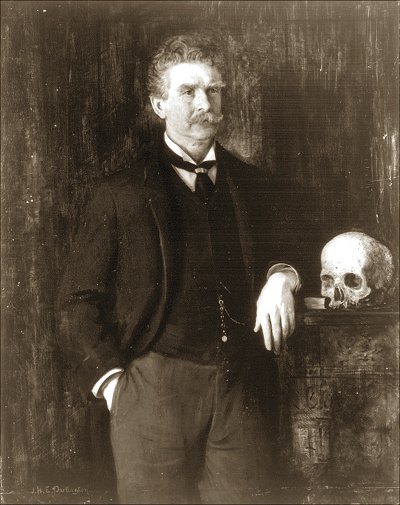
Ambrose Bierce
(1842-1914?)
A Commuted Sentence
Boruck and Waterman upon their grills
In Hades lay, with many a sigh and groan,
Hotly disputing, for each swore his own
Were clearly keener than the other’s ills.
And, truly, each had much to boast of–bone
And sinew, muscle, tallow, nerve and skin,
Blood in the vein and marrow in the shin,
Teeth, eyes and other organs (for the soul
Has all of these and even a wagging chin)
Blazing and coruscating like a coal!
For Lower Sacramento, you remember,
Has trying weather, even in mid-December.
Now this occurred in the far future. All
Mankind had been a million ages dead,
And each to her reward above had sped,
Each to his punishment below,–I call
That quite a just arrangement. As I said,
Boruck and Waterman in warmest pain
Crackled and sizzed with all their might and main.
For, when on earth, they’d freed a scurvy host
Of crooks from the State prison, who again
Had robbed and ravaged the Pacific Coast
And (such the felon’s predatory nature)
Even got themselves into the Legislature.
So Waterman and Boruck lay and roared
In Hades. It is true all other males
Felt the like flames and uttered equal wails,
But did not suffer them; whereas they bored
Each one the other. But indeed my tale’s
Not getting on at all. They lay and browned
Till Boruck (who long since his teeth had ground
Away and spoke Gum Arabic and made
Stump speeches even in praying) looked around
And said to Bob’s incinerated shade:
“Your Excellency, this is mighty hard on
The inventors of the unpardonable pardon.”
The other soul–his right hand all aflame,
For ’twas with that he’d chiefly sinned, although
His tongue, too, like a wick was working woe
To the reserve of tallow in his frame–
Said, with a sputtering, uncertain flow,
And with a gesture like a shaken torch:
“Yes, but I’m sure we’ll not much longer scorch.
Although this climate is not good for Hope,
Whose joyous wing ‘twould singe, I think the porch
Of Hell we’ll quit with a pacific slope.
Last century I signified repentance
And asked for commutation of our sentence.”
Even as he spoke, the form of Satan loomed
In sight, all crimson with reflections’s fire,
Like some tall tower or cathedral spire
Touched by the dawn while all the earth is gloomed
In mists and shadows of the night time. “Sire,”
Said Waterman, his agitable wick
Still sputtering, “what calls you back so quick?
It scarcely was a century ago
You left us.” “I have come to bring,” said Nick,
“St. Peter’s answer (he is never slow
In correspondence) to your application
For pardon–pardon me!–for commutation.
“He says that he’s instructed to reply
(And he has so instructed me) that sin
Like yours–and this poor gentleman’s who’s in
For bad advice to you–comes rather high;
But since, apparently, you both begin
To feel some pious promptings to the right,
And fain would turn your faces to the light,
Eternity seems all too long a term.
So ’tis commuted to one-half. I’m quite
Prepared, when that expires, to free the worm
And quench the fire.” And, civilly retreating,
He left them holding their protracted meeting.
.jpg)
Ambrose Bierce poetry
fleursdumal.nl magazine
More in: Archive A-B, Bierce, Ambrose
![]()
William Henry Drummond
(1854 – 1907)
Madeleine Vercheres
I’ve told you many a tale, my child, of the old heroic days
Of Indian wars and massacre, of villages ablaze
With savage torch, from Ville Marie to the Mission of Trois Rivieres
But never have I told you yet, of Madeleine Vercheres.
Summer had come with its blossoms, and gaily the robin sang
And deep in the forest arches the axe of the woodman rang
Again in the waving meadows, the sun-browned farmers met
And out on the green St. Lawrence, the fisherman spread his net.
And so through the pleasant season, till the days of October came
When children wrought their parents, and even the old and lame
With tottering frames and footsteps, their feeble labors lent
At the gathering of the harvest le bon Dieu himself had sent.
For news there was none of battle, from the forts on the Richelieu
To the gates of the ancient city, where the flag of King Louis flew
All peaceful the skies hung over the seignerie of Vercheres,
Like the calm that so often cometh, ere the hurricanes rends the air.
And never a thought of danger had the Seigneur sailing away,
To join the soldiers of Carignan, where down at Quebec they lay,
But smiled on his little daughter, the maiden Madeleine,
And a necklet of jewels promised her, when home he should come again.
And ever the days passed swiftly, and careless the workmen grew
For the months they seemed a hundred, since the last war-bugle blew.
Ah! little they dreamt on their pillows, the farmers of Vercheres,
That the wolves of the southern forest had scented the harvest fair.
Like ravens they quickly gather, like tigers they watch their prey
Poor people! with hearts so happy, they sang as they toiled away.
Till the murderous eyeballs glistened, and the tomahawk leaped out
And the banks on the green St. Lawrence echoed the savage shout.
“Oh mother of Christ have pity,” shrieked the women in despair
“This is no time for praying,” cried the young Madeleine Vercheres,
“Aux armes! aux armes! les Iroquois! quick to your arms and guns
Fight for your God and country and the lives of the inocent ones.”
And she sped like a deer of the mountain, when beagles press close behind
And the feet that would follow after, must be swift as the prairie wind.
Alas! for the men and women, and litle ones that day
For the road it was long and weary, and the fort it was far away.
But the fawn had outstripped the hunters, and the palisades drew near,
And soon from the inner gateway the war, bugle rang out clear;
Gallant and clear it sounded, with never a note of despair
‘T was a soldier of France’s challenge, from the young Madeleine Vercheres.
“And this is my little garrison, my brothers Louis and Paul?
With soldiers two, and a cripple? may the Virgin pray for us all.
But we’ve powder and guns in plenty, and we ‘ll fight to the latest breath
And if need be for God and country, die a brave soldier’s death.
“Load all the carabines quickly, and whenever you sight the foe
Fire from the upper turret, and the loopholes down below.
Keep up the fire, brave soldiers, though the fight may be fierce and long
And they ‘ll think out little garrison is more than a hundred strong.”
So spake the maiden Madeleine, and she roused the Norman blood
That seemed for a moment sleeping, and sent it like a flood
Though every heart around her, and they fought the red Iroquois
As fought in the old time battles, the soldiers of Carignan.
And they say the black clouds gathered, and a tempest swept the sky
And the roar of the thunder mingled with the forest tiger’s cry
But still the garrison fought on, while the lightning’s jagged spear
Tore a hole in the night’s dark curtain, and showed them a foeman near.
And the sun rose up in the morning, and the color of blood was he
Gazing down from the heavens on the little company.
“Behold! my friend!” cried the maiden,” ‘t is a warning lest we forget
Though the night saw us do our duty, our work is not finished yet.”
And six days followed each other, and feeble her limbs became
Yet the maid never sought her pillow, and the flash of the carabines’ flames
Illuminated the powder-smoked face, aye, even when hope seemed gone
And she only smiled on her comrades, and told them to fight, fight on.
And she blew a blast on the bugle, and lo! from the forest black
Merrily, merrily ringing, an answer came pealing back
Oh! pleasant and sweet it sounded, borne on the morning air,
For it heralded fifty soldiers, with gallant De la Monniere.
And when he beheld the maiden, the soldier of Carignan,
And looked on the little garrison that fought the red Iroquois
And held their own in the battle, for six long weary days,
He stood for a moment speechless, and marvelled at woman’s ways.
Then he beckoned the men behind him and steadily they advance
And with carabines uplifted, the veterans of France
Saluted the brave young captain so timidly standing there
And they fired a volley in honor of Madeleine Vercheres.
And this, my dear, is the story of the maiden Madeleine
God grant that we in Canada may never see again
Such cruel wars and massacres, in waking or in dream
As our fathers and mothers saw, my child, in the days of the old regime.
William Henry Drummond poetry
kempis poetry magazine
More in: Archive C-D
Thank you for reading Fleurs du Mal - magazine for art & literature